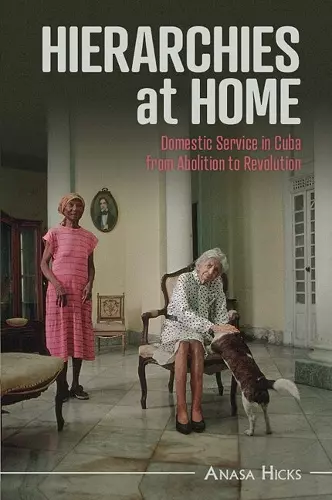Hierarchies at Home
Domestic Service in Cuba from Abolition to Revolution
Format:Paperback
Publisher:Cambridge University Press
Published:8th Aug '24
Currently unavailable, and unfortunately no date known when it will be back
This paperback is available in another edition too:
- Hardback£75.00(9781316513651)

This book destabilizes racialized and gendered assumptions about labour in Cuba and challenges traditional chronologies of 20th-century Cuban history.
Hierarchies at Home traces the experiences of Cuban domestic workers from the abolition of slavery through the 1959 revolution, centering the quotidian work that so many Cubans – in particular black Cuban women – did to survive. A fascinating, unique work on Cuban history that challenges established narratives.Hierarchies at Home traces the experiences of Cuban domestic workers from the abolition of slavery through the 1959 revolution. Domestic service – childcare, cleaning, chauffeuring for private homes – was both ubiquitous and ignored as formal labor in Cuba, a phenomenon made possible because of who supposedly performed it. In Cuban imagery, domestic workers were almost always black women and their supposed prevalence in domestic service perpetuated the myth of racial harmony. African-descended domestic workers were 'like one of the family', just as enslaved Cubans had supposedly been part of the families who owned them before slavery's abolition. This fascinating work challenges this myth, revealing how domestic workers consistently rejected their invisibility throughout the twentieth century. By following a group marginalized by racialized and gendered assumptions, Anasa Hicks destabilizes traditional analyses on Cuban history, instead offering a continuous narrative that connects pre- and post-revolutionary Cuba.
'Hierarchies at Home is a much needed addition to Cuban history. Anasa Hicks brilliantly shows how the myths and realities around domestic servitude were key to creating and maintaining anti-Black racial and gender norms from the republican era through the 1959 Revolution. Her focus on domestic workers yields new insights into labor, gender, and race across traditionally bifurcated time periods. By illuminating the under researched topic of Black women's labor in twentieth century Cuba, Hicks alters our understanding of Cuban history itself.' Devyn S. Benson, University of Kentucky
'In this innovative, impressively researched social history, Anasa Hicks recovers the experiences of Black domestic workers in Cuba from multiple forms and generations of political and archival erasure. This is a history of people supposedly without history, to paraphrase Cuban historians Pedro Deschamps Chapeaux and Juan Pérez de la Riva, one characterized by change over time – especially after 1959 – but also vexing continuity. An exciting entry into the new Cuban historiography.' Michael J. Bustamante, University of Miami
'Hierarchies at Home explodes the myth of the 'respectable' Cuban family whose whiteness often depended on the exploitation and invisibility of Black and female labor. With meticulous research and scrutinizing insight, Anasa Hicks illuminates the continuity of violence, racial prejudice and gendered scripts that confined the agency of domestics by 'unsilencing' their voices and perspectives. Ignored by contemporaries and historians alike, Black domestics emerge as central protagonists in the struggle over who and how Cuba would define modernity, citizenship and national wholeness amidst the legacies of slavery.' Lillian Guerra, University of Florida
'Hicks's work fills a significant void in the historiography of Cuba, which has long been dominated by narratives of slavery and revolution. She (rightly) centers domestic labor in the debates over what it meant to be Cuban, both before and after the revolution. Her work calls on historians to reevaluate how we examine traditional studies of labor and activism, much as has been done for studies of slavery and resistance, and is essential reading for scholars of Cuba.' Sarah L. Franklin, Hispanic American Historical Review
ISBN: 9781009074513
Dimensions: 229mm x 152mm x 13mm
Weight: 367g
220 pages